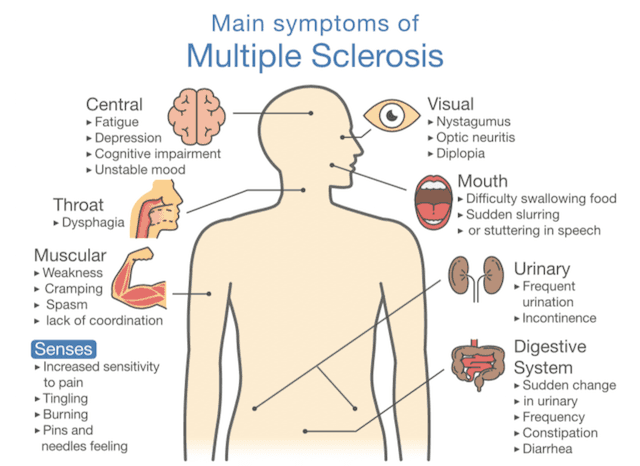Affecting the life quality of so many people all around the globe, multiple sclerosis tends to be a sensitive issue to talk about. Attacking the brain and the spinal cord, MS (as multiple sclerosis is often referred to) is an issue that can cause permanent damage to one’s nerves. Today, we’re going to learn more about what MS is, how it impacts a person’s life, and how we can manage to get a decent night’s sleep in spite of having this life-changing problem.
What Is Multiple Sclerosis?
A person that suffers from MS will have their immune system attack the myelin, which is a protective sheath that surrounds the nerve fibers. As this attack occurs, it creates problems in how the brain and the rest of your body communicate. In time, these nerves can suffer irreparable damage, which is why MS usually has life-long consequences, especially since MS can’t be cured.
There are several symptoms that might make an appearance when a person suffers from MS and these symptoms depend on the stage of the disease and which nerves in specific are being attacked. It is very uncommon for MS symptoms to impact a person’s movement. A person with MS can experience numbness/weakness in one or more limbs, lack of coordination, and shocking sensations that feel like electrical impulses when moving the neck.

Some of the risk factors for developing MS include: age (typically around 20 or 40 years of age), sex (women are more likely to have relapsing-remitting MS), a family history of people suffering from MS, climate (people living in temperate climates are more exposed to MS), infections, autoimmune diseases (not all, but people who have psoriasis, thyroid disease, and others, are more exposed to MS), and smoking.
How MS Affects Sleep
MS affects a person’s sleep in more than one: either directly, through the symptoms that cause pain and discomfort, and indirectly, by causing people to develop anxiety and depression that eventually keeps them awake at night. This turns out to be a vicious circle, since MS affects the quality of sleep and poor sleep eventually lead to problems that impact the energy and mood of a patient up to a point where MS symptoms begin to appear more frequently and start to feel much worse. It is also likely for this cycle to cause cognitive decline.

It is also common for people with MS to experience the need to have to use the toilet multiple times per night. Needless to say, this can disrupt a person’s sleep severely, making it difficult for a MS patient to go back to sleep. This reduces the time a person spends in the deep sleep stage, which prevents them from experiencing the full sleep cycles that are needed for the body and mind to recuperate. Sleep can also be impacted by the person’s inability to exercise and MS medication can also take a toll on sleep quality.

Even if fatigue is one of the first symptoms of MS, it is also the one that gets the least attention, in spite of the fact that it takes a huge toll on the daily life quality of a patient. A lot of people see this fatigue as being a side-effect for MS, but it can often come from a variety of causes, including really high melatonin levels or an underlying sleeping disorder. Fatigue doesn’t usually come alone, as it is often accompanied by depression, anxiety, stress, and pain.
What Sleeping Disorders Are Associated with MS
Another relationship between MS and sleep is exhibited by patients that end up developing one or more sleeping disorders as the disease progresses. They commonly appear because of lesions that are formed in areas of the spinal cord and the brain, meaning that different people with MS will develop different kinds of sleeping disorders because of that. The most common sleeping disorders that MS patients experience include:
- Insomnia – People that suffer from insomnia have problems either falling asleep, sleeping well, or staying asleep. There are plenty of things that can contribute to insomnia in a patient that already suffers from multiple sclerosis, including the need to urinate often when sleeping, pain and discomfort, and different other sleeping disorders.
- Circadian rhythm problems – The human body has a natural sleeping cycle which is called the circadian rhythm. When this natural sleep cycle is affected, it can lead to a series of other problems, including insomnia or daytime sleepiness. MS patients are known to suffer from abnormal melatonin production, which means they are more likely to experience a level of fatigue that will often cause them to sleep during the day, thus disrupting the body’s circadian rhythm.
- RLS and PLMD – Short for “Restless Legs Syndrome” and “Periodic Limb Movement Disorder”, these are two more sleeping conditions that are likely to affect the sleep of people suffering from MS. Restless leg syndrome is a condition that translates into an urge to move one’s legs while lying in bed. Periodic limb movement disorder is what causes people to twitch their legs. Both of these conditions can make it uncomfortable for a person to fall asleep, but can also cause them to wake up, thus affecting their overall sleep quality.
- Sleep apnea – Probably one of the most well-known sleeping disorders is sleep apnea. This is a condition that causes breathing interruptions, causing people to wake up as they gasp for air. While there are plenty of people without MS that suffer from sleep apnea, it is often encountered in people who suffer from MS and have lesions in their brain stem. Thankfully, sleep apnea is often kept under control using a CPAP machine (short for “continuous positive airway pressure”) which helps regulate the air intake of a sleeper, helping them breathe properly.
- REM sleep behavior disorder – When we sleep at night, we go through a cycle that repeats itself a few times before we wake up feeling fully rested. The most restorative part of this sleep cycle is called REM sleep (short for Rapid Eye Movement). In this stage, our muscles are usually paralyzed and the brain and body recuperate. People that suffer from REM sleep behavior disorder will often act out their dreams, with a percentage of them doing so in dangerous and violent ways. It is believed that MS patients that do so have their brain stem damaged.
- Narcolepsy – People that have narcolepsy experience episodes of extreme sleepiness throughout the day and, in some cases, these episodes can be accompanied by hallucinations and muscle paralysis. Both multiple sclerosis and narcolepsy are connected to lateral hypothalamus lesions, a part of the brain that helps regulate wakefulness.
Tips for Sleeping with MS
A good night’s sleep can do wonders for a person’s physical and mental health. Sadly, people that end up suffering from multiple sclerosis will have their sleep quality take a huge hit, and it’s really important to know what are the several tips and resources that a patient can turn to in order to deal with this problem. Even if multiple sclerosis can’t be cured, there are ways to deal with it to minimize the impact it can have on their lives, sleeping patterns included.
#1: Take care of your sleep hygiene.
Regardless of whether or not you have MS, it’s important for you to take into account the steps that are required to prepare your body and your mind for bed time. There are are several things that are part of a proper sleep hygiene including:
- Making sure you don’t use electronics at least one hour before bed, as they decrease melatonin production.
- Avoiding heavy meals before bed.
- Avoiding drinking too many liquids that could increase the need to urinate frequently, thus waking you up during the night.
- Limiting alcohol and caffeine intake, and quitting smoking.
- Avoiding naps in the evening.
- Maintaining a consistent sleep routine, implying that you wake up at the same hour every morning and going to bed at the same time every night.
- Keeping the bedroom at an optimal sleeping temperature.
#2: Keep in mind that people with MS have special sleep hygiene requirements.
When suffering from multiple sclerosis, there are certain aspects of the sleep hygiene process that require more attention because of higher risk and sensitivity. For example, people that suffer from MS are more sensitive to heat, which makes it even more important for them to sleep in a cooler bedroom. At high temperatures, some MS symptoms might trigger, thus preventing them from sleeping properly.
Because one of the symptoms of MS is frequent urination, it becomes even more important for people with MS to limit their liquid intake before bedtime. They should also avoid drinking caffeine and alcohol, and make sure they go to the bathroom right before going to bed.

Patients diagnosed with MS are more likely to need cognitive behavioral therapy for their insomnia, which means they have to talk to a specialist that can help them work through their depression and anxiety.
#3: Don’t be ashamed to talk to a mental health expert.
As we’ve mentioned before, people with multiple sclerosis will have their life quality impacted on both a physical and a mental level. Depression is very common amongst people that suffer from multiple sclerosis, a problem that also induces insomnia. Thankfully, mental health care experts are now easier to find and can help a lot in this process.

If you choose the last option, you will be engaged in a form of talk therapy that helps you adjust your thinking patterns from negative thoughts to more hopeful ones. This type of therapy can go a long way in helping you reduce symptoms of depression, lower anxiety levels, and improve pain management.
#4: Learn the different approaches to pain management.
Patients that suffer from MS are likely to experience muscle spasticity, burning sensations, and pain throughout the night. These pain levels might change throughout the day, but night time usually brings more relaxation and that’s when people start becoming more aware of the discomfort they experience.
A very common thought is to turn to opioids and medication that helps deal with pain, but doctors might suggest other approaches that might turn out to be better in the long run. Amongst the different multidisciplinary approaches, doctors recommend considering acupuncture, physical therapy, meditation, and massages, all of which can help in reducing pain and discomfort.

#5: Adjust your physical activity based on your needs.
Studies have revealed that people diagnosed with MS are more likely to have their sleep quality improved through exercise. However, this can be quite a tricky thing to do because fatigue and other MS symptoms often get in the way of a person’s energy levels, reducing their physical functions and making exercising more difficult and frustrating.

Keep in mind that even small changes can make an impact in a person’s sleep quality, even if we’re talking about a 10-minute yoga session in the morning. These exercises can help get the blood flowing and contribute to the release of endorphins, meaning the brain gets help in adjusting its sleep cycles.
It’s also important that you schedule this activity a few hours before going to bed, as there are chances that these exercises will leave the body feeling too energized to sleep.
#6: Keep a close eye on your vitamin levels.

There are some foods that you can add to your diet which are pretty rich in iron, such as beans and red meat. Vitamin D can be found in leafy green vegetables and dairy. However, keep in mind that your body can produce its own vitamin D when exposed to the sun.
People that have iron deficiency anemia don’t have enough red blood cells in their body, cells that are responsible for transporting oxygen inside the body. In turn, this can also cause increased levels of fatigue. While supplements can help, always talk to your doctor instead of taking them without talking to a specialist.
#7: Take control over your bowels and bladder.
A very common problem that causes sleep disruptions in patients diagnosed with MS is their need to visit the bathroom way too often at night, disrupting their sleep and decreasing the sleep quality. There are several things you can do not to prevent this from happening entirely, but at least to keep it under control as much as you can.

There are certain types of MS medication that cause you to urinate more frequently, and the doctor might suggest taking those earlier in the day rather than before bedtime.
If need be, you can also turn to a gastroenterologist to help identify any potential food intolerance. An urologist can also help you identify more efficient ways to empty your bladder fully before going to bed.
You might be interested: Sleep Tips and Bedding Products For People With MS
Conclusion
People that suffer from multiple sclerosis have to deal with a lot of physical and emotional baggage at once. Sleep is a very important part of a person’s life that people with MS have to deal with in the most unpleasant of ways. As you might have read in our article, MS leads to a series of sleeping disorders but also impacts sleep at an emotional level, causing anxiety, stress, and depression, all of which are risk factors for sleep deprivation. If you know someone who is suffering from multiple sclerosis, offering your support might mean more than you think.
Photo credit: Miriam Doerr Martin Frommherz/Shutterstock; solar22/Shutterstock



